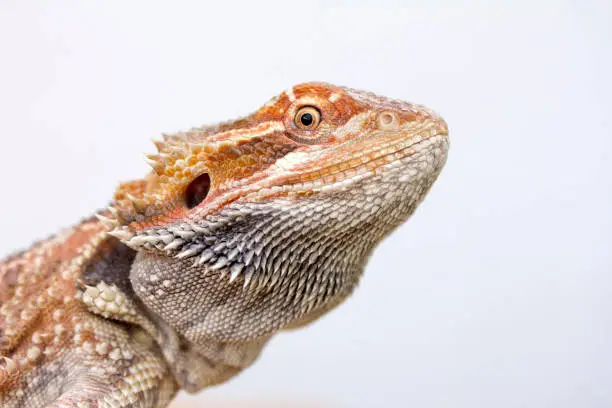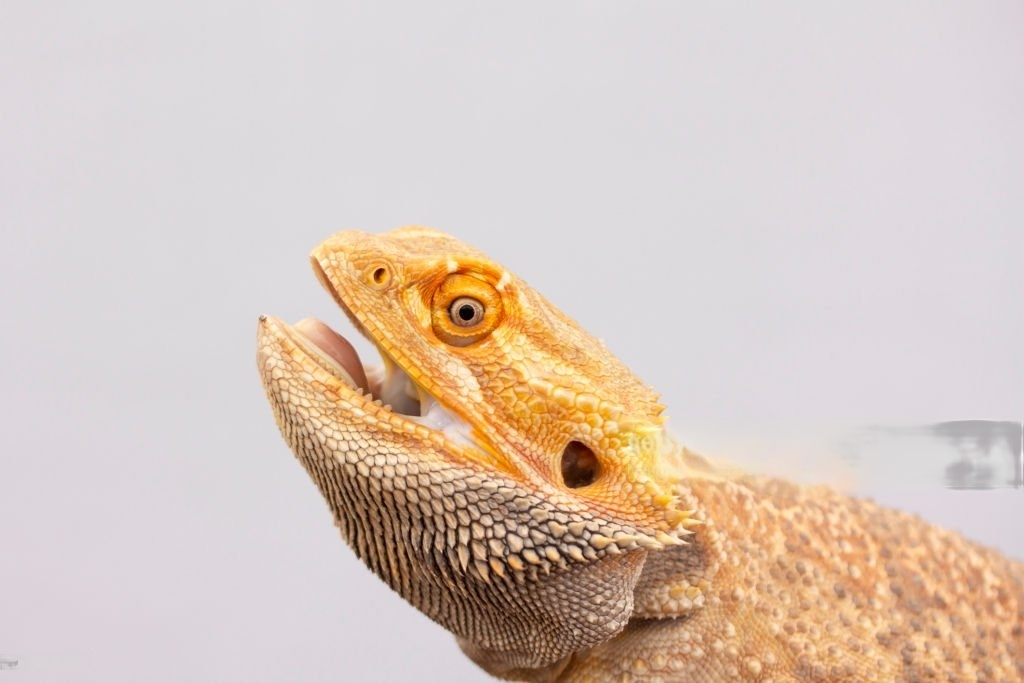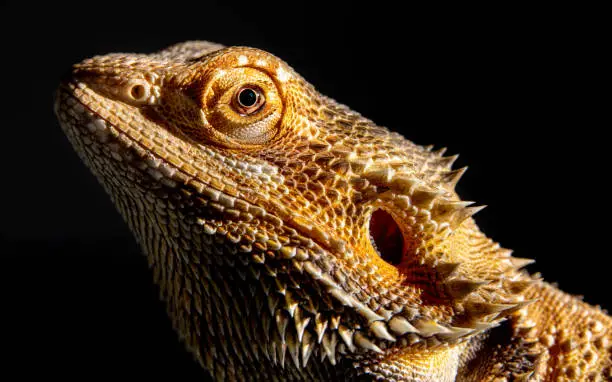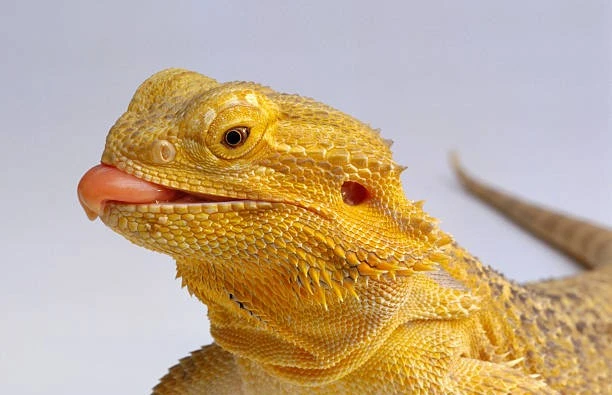Bearded dragons are amazing creatures that can bring a lot of joy to the lives of their owners.
However, just like with any pet, there are potential issues and concerns that come along with owning one. One such issue is bearded dragon choking, which can be incredibly frightening for both the owner and their beloved reptilian friend.
To help ensure your beardie stays safe and healthy, it’s important to understand what causes this issue and how you can prevent or handle it in an emergency situation.
A bearded dragon can choke on foods that are too big or large substances such as bark, sand, twigs, or large insects. There are also so many reasons why this can happen to a bearded dragon, depending on the situation. Choking may result in death in some cases. Thus, it is important that you are familiar with everything regarding choking in bearded dragons as a caregiver.
In this article, I will go over what exactly bearded dragon choking is, why they do it and provide tips on how to manage any choking incidents that may occur.
Be sure to read through everything thoroughly so that if an emergency ever arises, you know exactly how best to respond.
How To Know If A Bearded Dragon Is Choking

Ah, the beloved bearded dragon. Such a majestic creature, with their unique personality and quirky behavior. They are so easy to take care of – or so we think!
It can be difficult to tell when your reptilian companion is in distress, especially if they’re choking. What’s a pet parent to do?
Well, you’ve come to the right place for help. Here are some tips on how to know if your furry friend is having trouble breathing:
Observe any unusual movements or behaviors that may indicate something isn’t quite right. It might be time to see your veterinarian if they arch their back, stretch their neck, or generally move around while trying to breathe. Ensure they are not wheezing or gurgling or breathing open-mouth instead of normally through the nose -both of which are red flags.
Lastly, look at their coloration; if they appear pale or have bluish tones along their extremities such as toes and tail tip then this may be another indication there’s something wrong.
It’s always better to play it safe rather than sorry when it comes to our scaly friends’ health. So, don’t hesitate to contact your vet immediately if you have any doubts about whether or not your dragon is choking.
There’s no need for guesswork here – let the professionals handle it and get your buddy feeling better sooner rather than later!
Can Bearded Dragons Choke To Death?

There is a possibility that bearded dragons can choke to death, but it is rare. Bearded dragons can choke when they ingest something too large to swallow and it gets stuck in their throat or esophagus. It may cause death or suffocation in some cases.
Be aware that bearded dragons often eat things they shouldn’t, such as small stones, bark pieces, or other objects. They could choke if these items could not be passed through their digestive tract.
Additionally, if you’re feeding your pet live insects such as crickets or mealworms, make sure they are sized appropriately for the size of your beardie; otherwise, he/she might try to eat too much at once and end up with an object lodged in his/her throat.
To help prevent accidental choking incidents from occurring, always supervise your bearded dragon while he/she is exploring its enclosure and take extra care when handling him/her during feedings.
If you suspect your pet has swallowed something dangerous or become choked on food debris, get veterinary attention immediately.
What Are The Signs That Your Beardie Is Choking?
When it comes to your bearded dragon, you want to make sure they don’t choke. But how can you tell if that’s the case?
Well, there are a few signs of choking in your beardie that you should be aware of.
Rapid breathing is one of the first signs. If your beardie takes a lot of breaths per minute, and their chest expands as they breathe out, they may even wheeze. As a result of trying to swallow something too large for them, they may drool excessively. Another sign is an open-mouth breathing position that may indicate difficulty getting air into their lungs.
If any of these symptoms appear when your beardie is eating or drinking, then chances are they’re suffering from some kind of blockage in their throat or esophagus.
You’ll need to act quickly by removing the food item or liquid from the tank and taking your pet to see a vet immediately before it becomes life-threatening!
What Could Cause A Bearded Dragon To Start Choking Or Gasping?

Choking or gasping in a bearded dragon can be an alarming experience for any owner. It’s important to understand the potential causes of this behavior and how best to respond.
From environmental conditions to diet, there are several things that could cause your pet reptile to start choking or gasping:
Environmental Conditions:
Temperature – Too hot or too cold temperatures can both lead to breathing difficulties in bearded dragons. Make sure you keep their environment between 80-85℉ during the day and 75-80℉ at night.
Humidity – If humidity levels get too high it can make it difficult for reptiles like bearded dragons to breathe properly. To ensure optimal air quality, use a hygrometer and aim for 30-50%RH in the enclosure.
Air Quality – Poor ventilation inside the enclosure will also affect their ability to breathe normally so check regularly for built-up dust and ammonia levels.
Diet:
Overfeeding – Giving your beardie more food than they need can become a problem. Try using mealworms instead of crickets as live food since these tend to be higher in protein but lower in fat content.
Feeding Live Foods – Insects like waxworms, butterworms, and silkworms contain more fat than other types of insects which can cause digestive issues if fed frequently. Instead, try feeding smaller amounts of earthworm once per week as a treat.
Vitamin/Mineral Imbalances – An unbalanced diet can result in deficiencies which when coupled with poor air quality can lead to respiratory distress such as coughing or gagging.
Be sure you’re providing them with appropriate nutrition by offering leafy greens every day along with occasional fruits and vegetables as treats.
What To Do If A Bearded Dragon Is Choking
If a reptile appears to be gasping for air or flailing about, it could be a sign that they are struggling with something lodged in its throat.
In this case, immediate action needs to be taken in order to avoid serious health issues.
The first step should always be checking the mouth and throat of your pet. Carefully inspect them for any blockages before attempting anything else. You can also gently press on their abdomen area while observing their behavior; if they appear more relaxed afterwards then there may have been an obstruction present which has since been removed.
It’s also worth noting that some reptiles (such as Bearded Dragons) will sometimes act like they’re choking when they simply need to clear out mucus from their throats.
To help provide relief during these times, try offering small pieces of wet food or lightly warm water mixed with vegetable broth until the irritation subsides.
With proper care and attention paid to potential risks, you can ensure that your pet remains healthy and happy!
What To Do If A Bearded Dragon Is Gagging
Just as when a bearded dragon is choking, it’s important to stay calm. If your pet is gagging, take a few deep breaths and assess the situation before you act.
Gagging can be caused by many different things like food stuck in its throat or even simply regurgitating its own saliva.
| Symptoms | Possible Cause | Treatment |
|---|---|---|
| Coughing/Gagging up Food Particles | Ingestion of too large pieces of food or foreign objects such as substrate (bedding) particles being inhaled into the lungs causing inflammation and irritation outside the esophagus. | Remove any potential irritants from around the reptile’s environment and monitor closely to ensure no further issues arise. Administer antibiotics if necessary. Force-feed small amounts of wetted food or fluids via syringe every 15 minutes until vomiting ceases. Consult with an experienced veterinarian for medical advice on care. |
| Retching without Expelling Anything Upwards | Regurgitation of salivary glands due to stress, excessive heat exposure, dehydration, improper diet or other health conditions that need veterinary attention; turtles may also gag while shedding skin flakes through their mouth openings. | Provide a cool and well-ventilated area away from direct sunlight and drafts. Increase humidity levels in the enclosure by misting twice daily with warm water and supplementing meals with fresh vegetables high in moisture content such as carrots and celery stalks; inspect for signs of infection or illness which require professional assistance from a qualified herp vet. |
Observe your pet carefully so that you can identify what might be causing them distress and address it accordingly – whether this means providing cooler temperatures, administering medication prescribed by your veterinarian, removing hazards from their habitat, or providing them with more nutritious foods.
As always, contact an experienced herpetologist if symptoms persist or worsen over time.
What To Do If Your Bearded Dragon Is Choking On Food

When your beloved bearded dragon is choking, it can feel like the world stands still. Every second feels like a year, and you’re desperate to help them.
Take a deep breath, as we’ll provide some helpful tips on how to save your pal from this precarious predicament.
First and foremost, remain calm! The last thing you want to do is panic or make sudden movements that could startle or agitate your pet further.
You should check your beardie’s mouth quickly if they are struggling for air to see if there is a foreign object blocking their throat. If they have an obstruction in their throat, try to remove it gently. However, always use caution when doing so – don’t put your beardie at risk by using something sharp or pointy.
If all else fails, take your beardie straight away to a vet who specializes in reptiles – they have the expertise and knowledge needed to give him/her the best care possible.
It’s also important to keep an eye on his/her diet. Avoid feeding them large pieces of food that are too big for them and practice regular health checks just in case anything happened during the incident that needs monitoring down the line.
What To Do If Your Bearded Dragon Is Choking On Water
If you think your bearded dragon is choking on water, the first thing to do is remain calm. Panic will not help anyone and could make things worse for your pet.
Next, carefully scoop up the animal with both hands, supporting its body from underneath and place your beardie in a shallow bowl of warm water to wet its head and ease any discomfort or trauma. Once your beardie has calmed down and stopped struggling, slowly lower them back into the tank and observe from a distance.
If he appears to still be having difficulty breathing, gently pour some lukewarm water over his head and neck area until it begins to flow down his throat – this can act as a form of artificial respiration which may help him start breathing again.
Make sure not to force too much water into his mouth as this may cause further complications.
When your pet starts showing signs of life such as blinking its eyes or moving around in the tank again, provide it with easy-to-digest food such as cooked veggies or small insects if necessary – these should aid recovery significantly by providing some nourishment after being starved of oxygen for a period of time.
Monitor him closely during the next few days to check for any long-term effects; if anything seems off then contact your veterinarian immediately for advice about what steps need to be taken next.
How can you prevent your bearded dragon from choking on its food?
There are several ways to prevent your bearded dragon from choking on its food:
- Offer appropriate-sized food: Make sure to offer appropriately sized food items to your bearded dragon. The size of the food should not be too big to swallow whole or too small that they might not be able to grab it easily.
- Offer a variety of food: Bearded dragons have different food preferences and feeding habits. Offer a variety of food items such as crickets, mealworms, vegetables, and fruits to ensure that your bearded dragon has a balanced diet.
- Properly prepare the food: Be sure to properly prepare the food by removing any hard shells or spines. For example, remove the head of crickets before feeding them to your bearded dragon.
- Supervise feeding: Always supervise your bearded dragon while they are eating. This will allow you to intervene if they show any signs of choking or difficulty swallowing.
- Offer water: Ensure that your bearded dragon has access to water. This will help them to swallow their food more easily.
- Regular vet check-ups: Take your bearded dragon to the vet for regular check-ups. This will help to ensure that they are healthy and that there are no underlying health issues that may cause them to choke on their food.
Conclusion
It’s a scary sight when your beloved bearded dragon is choking. Most owners will find themselves in this situation at some point, but with the right knowledge and preparation, it doesn’t have to be a terrifying experience.
It’s important to understand what could cause a beardie to start choking or gasping so you can take steps to prevent it from happening. Knowing how to recognize signs of choking and what to do if they occur are crucial pieces of information that all beardie owners should know.
We must also consider other potential dangers such as cats attacking our little dragons – thankfully, we can take steps to minimize these risks before they become an issue.
By monitoring their environment closely and taking precautions like removing any objects that might pose a risk, we can protect them from harm – both physical and psychological.
Finally, although there may be times when our bearded dragon chokes or finds itself in danger, knowing how to handle these situations calmly and confidently goes a long way towards ensuring our pets stay healthy and safe for years to come.
After all, prevention is always better than cure! As the old adage goes “An ounce of prevention is worth a pound of cure”
FAQs
Can bearded dragons choke on hornworms?
The large size of hornworms may cause bearded dragons to choke. Bearded dragons can be harmed by wild hornworms, as they can contain parasites and bacteria that are toxic to them. Therefore, it is important to only feed them hornworms that have been bred in captivity. Choking is also an issue when food is larger than their eyes.
Can bearded dragons choke on sand?
Yes, bearded dragons can choke on the sand. Loose substrates such as sand or pellets can cause a severe blockage if swallowed for an extended period of time and lead to impaction in bearded dragons
Can my bearded dragon choke on crickets?
Yes, bearded dragons can choke on crickets that are too big. If you notice coughing or a gagging sound, it’s possible that your bearded dragon is choking and you should try to clear the throat if possible.
Can a bearded dragon choke on lettuce?
Yes, a bearded dragon can choke on lettuce if it is not cut into bite-sized pieces. While bearded dragons cannot technically choke on their food, they can die if they try to eat something that is too big for their mouth
